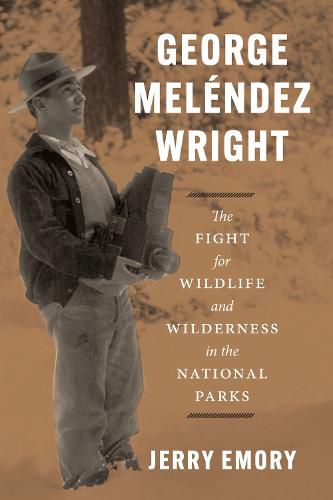Readings Newsletter
Become a Readings Member to make your shopping experience even easier.
Sign in or sign up for free!
You’re not far away from qualifying for FREE standard shipping within Australia
You’ve qualified for FREE standard shipping within Australia
The cart is loading…






The first biography of a visionary biologist whose groundbreaking ideas regarding wildlife and science revolutionized national parks.
When twenty-three-year-old George Melendez Wright arrived in Yosemite National Park in 1927 to work as a ranger naturalist-the first Hispanic person to occupy any professional position in the National Park Service (NPS)-he had already visited every national park in the western United States, including McKinley (now Denali) in Alaska. Two years later, he would organize the first science-based wildlife survey of the western parks, forever changing how the NPS would manage wildlife and natural resources. At a time when national parks routinely fed bears garbage as part of "shows" and killed "bad" predators like wolves, mountain lions, and coyotes, Wright's new ideas for conservation set the stage for the modern scientific management of parks and other public lands.
Tragically, Wright died in a 1936 car accident while working to establish parks and wildlife refuges on the US-Mexico border. To this day, he remains a celebrated figure among conservationists, wildlife experts, and park managers. In this book, Jerry Emory, a conservationist and writer connected to Wright's family, draws on hundreds of letters, field notes, archival research, interviews, and more to offer both a biography of Wright and a historical account of a crucial period in the evolution of US parks and the wilderness movement. With a foreword by former NPS director Jonathan B. Jarvis, George Melendez Wright is a celebration of Wright's unique upbringing, dynamism, and enduring vision that places him at last in the pantheon of the great American conservationists.
$9.00 standard shipping within Australia
FREE standard shipping within Australia for orders over $100.00
Express & International shipping calculated at checkout
The first biography of a visionary biologist whose groundbreaking ideas regarding wildlife and science revolutionized national parks.
When twenty-three-year-old George Melendez Wright arrived in Yosemite National Park in 1927 to work as a ranger naturalist-the first Hispanic person to occupy any professional position in the National Park Service (NPS)-he had already visited every national park in the western United States, including McKinley (now Denali) in Alaska. Two years later, he would organize the first science-based wildlife survey of the western parks, forever changing how the NPS would manage wildlife and natural resources. At a time when national parks routinely fed bears garbage as part of "shows" and killed "bad" predators like wolves, mountain lions, and coyotes, Wright's new ideas for conservation set the stage for the modern scientific management of parks and other public lands.
Tragically, Wright died in a 1936 car accident while working to establish parks and wildlife refuges on the US-Mexico border. To this day, he remains a celebrated figure among conservationists, wildlife experts, and park managers. In this book, Jerry Emory, a conservationist and writer connected to Wright's family, draws on hundreds of letters, field notes, archival research, interviews, and more to offer both a biography of Wright and a historical account of a crucial period in the evolution of US parks and the wilderness movement. With a foreword by former NPS director Jonathan B. Jarvis, George Melendez Wright is a celebration of Wright's unique upbringing, dynamism, and enduring vision that places him at last in the pantheon of the great American conservationists.